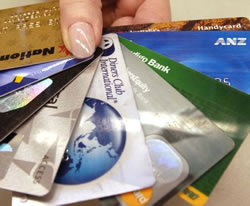Trent Hamm* says people have far more to lose when signing up for a store credit card than they could ever gain.
 You’re at a store and about to check out. The person behind the counter starts telling you about their store credit card and how it will save 30 per cent on your purchase today, or it’ll immediately give you $25 off.
You’re at a store and about to check out. The person behind the counter starts telling you about their store credit card and how it will save 30 per cent on your purchase today, or it’ll immediately give you $25 off.
It’s certainly tempting.
After all, if you just sign your name here and fill out this form, you get to keep more of your hard-earned money in your pocket. Why shouldn’t you do it?
It’s an experience most of us have had at one time or another.
Often, people say no because they’re in a rush, or they assume there’s some catch in the fine print, and they just don’t want to deal with it.
Sometimes, people do sign up to get those extra savings.
Is it worth it, though? For the most part, store credit cards are not worth signing up for.
What’s a store credit card?
Store credit cards are cards that only work at one retailer or a group of retailers.
For instance, the Target REDCard is used at Target stores for five per cent off purchases.
After purchases are charged to the card, it works much like a regular credit card in that cardholders have to pay off the balance lest they risk hits to their credit scores.
Are store credit cards useful?
Sometimes, but most of the time they are not.
If you frequent a grocery store that has its own store credit card, it can be a good idea to have one.
However, depending on the card’s rewards offers, you could also be better off getting a credit card with five per cent back at any grocery store — that way you’re not limited to just one chain.
Reasons to avoid store credit cards
The discount isn’t all that great
Unless you are making an enormous purchase, the actual amount you save with a store credit card signup bonus is tiny.
It’s usually just a tiny fraction of the amount of your purchase.
Sure, it’s savings, but the savings is minimal in the big scheme of things, and that small positive rarely outweighs the big negatives.
This is especially important when you consider that bonus in comparison to the reward you’re already getting from your primary card.
If the signup bonus is 10 per cent off but you’re already getting two per cent or three per cent cashback on your card, you’re really only getting a seven per cent or eight per cent bonus for the signup.
Store cards encourage further spending
Often, that sign-up bonus encourages people to do a little last-minute unplanned shopping.
If you go into a store planning to spend $200 and there’s a last-minute discount, people tend to try to get more stuff with the $200 they’ve set aside rather than be happy that they’re only spending $160 now.
The problem is that those final few purchases are usually very unplanned and poorly considered.
If there’s a purchase that’s going to wind up being stuffed in a closet and forgotten about in a few weeks, it’s this one.
If there’s ever an item you’re going to spend your money on only to find it in the back of the closet in a couple months as you wonder why you ever got this, it’s this kind of last-minute purchase.
You are far better off avoiding last-minute purchases, and these kinds of credit card signups strongly encourage you to make those kinds of unplanned purchases.
There’s not much of a reward beyond the initial bonus
Many in-store credit card signups offer you an initial reward for signing up, but then the ongoing benefit from the card is very limited.
Often, that ongoing benefit comes in the form of a “points” program where purchases on the card give you a tiny amount of credit at that store (often one per cent of your purchase price) or offer you a discount just at that retailer.
The truth is that there are many, many better rewards credit cards out there that will give you much better ongoing rewards than that.
By simply finding a rewards card that pays well at most of the places you shop and keeping the balance on that card paid off every month, you’re going to accrue far more rewards over the long run by simply using that rewards card everywhere.
The interest rates on in-store card offers are usually very high
If you’re buying something that you won’t be able to pay off immediately, you’ll find that in-store credit cards tend to have poor interest rates.
This means that interest will accumulate rapidly on the card if you don’t pay off that balance quickly.
In fact, given the small reward that many such cards offer, simply carrying a balance for a few months will almost always cost you far more than the initial reward was worth.
Some cards offer an initial 0 per cent interest rate to tempt you, but that teaser period is usually quite short, meaning that the overall savings is pretty small unless you are making a huge purchase.
Every card you sign up for is an additional identity theft risk
An additional factor to consider is the extra identity theft risk that comes with every card you sign up for.
Every credit card you have represents an account at a bank somewhere that could be hacked and a credit card number that could be stolen and used for undesirable purposes.
The fewer credit cards you have, the better in terms of identity theft.
If you are considering signing up for a new card, simply having that new card at all is a slight negative because of that identity theft risk.
When should I actually sign up for one?
Are there any situations where you should sign up for a store-branded credit card?
There are a few, but they’re not spur-of-the-moment events to save $20 at the checkout.
The best reason to sign up for a store-branded credit card is if it offers a reward program related to that retailer that will save you more money than other rewards cards.
This typically happens when you use that particular retailer a lot because it is your primary grocery store or gas station or both.
An example of this might be a Costco Anywhere Visa if you do most of your grocery shopping and gas purchases at a Costco and occasionally eat at restaurants.
In that specific situation, the Costco card is very competitive.
You should make that decision about switching to a store-branded card away from the checkout, however.
If a clerk springs a credit card offer on you, just say no unless you’ve already planned to sign up for the card.
Too long, didn’t read?
If you’re offered a great bonus on an in-store credit card at the checkout, just say no.
There are many strikes against signing up for an in-store card, even if the bonus offered is a good one.
In-store cards aren’t always bad, but signing up for one needs to be evaluated outside the heat of the moment.
There are good store-branded credit cards, but signing up for one at that moment just for the bonus is almost always a bad financial decision.
*Trent Hamm is the Founder of The Simple Dollar.
This article first appeared at thesimpledollar.com











